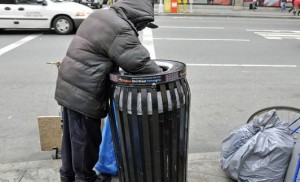
US cities’ crackdown on homeless people is ‘close to ethnic cleansing’
David Usborne
David Usborne reports on an insidious campaign to drive out vagrants by a combination of police harassment and increasingly draconian new ordinances
His face riven with lines forged by years on the streets, Gil reaches into the top pocket of his shirt and fishes out a wedge of grimy papers. These are the precious records of his life, documents the rest of us keep in a filing cabinet at home. Eventually he finds what he is looking for, a yellow slip that looks like a parking ticket.
That, as it happens, is about right, although Gil is not a man of many possessions and certainly not a car. He does, however, have size 13 shoes. In his hands is a police citation written a few weeks ago when an officer found him sitting on the kerb with his feet touching the road. “Feet in Roadway Disturbing Traffic,” it reads.
This is Fort Lauderdale, in Broward County, Florida, between Miami and Palm Beach, and Gil’s ticket – he gives his first name only – could be Exhibit A in what civil rights activists say is a creeping and insidious campaign by this and many other American cities to drive the homeless out of their midst by a combination of police harassment and increasingly draconian new ordinances that make being homeless a criminal offence.
It is a charge the city vehemently denies. But so far this year, it has passed two such laws, one making it illegal to urinate in public and another serving notice that any belongings left unattended on public property can be confiscated. More are pending, including one that would make it hard for charities to serve meals to the homeless in public spaces.
“It’s partly about the dollar but it’s also about the elitist mindset,” says Jeff Weinberger of the Broward Homeless Campaign. “They don’t want anything to upset their fantasy of a perfect existence.”
The homeless are an embarrassment for the town, said Arnold Abbott, a 90-year-old former police chief from Pennsylvania and director of Love Thy Neighbour, an organisation that has been feeding homeless here for over 20 years. Five times the city has tried and failed in court to stop him serving meals each Wednesday on the beach beneath the tourist strip.
The town, he said, really wants the homeless to go away. “They would like to put them in a bus and send them to Miami or Palm Beach. It’s very close to ethnic cleansing. But they are not going to succeed.”
“They want to drive us out of town every which way they can,” says Jimmy Singleton, 59, a one-time New York hairdresser now on his uppers. “They would like us to die.”
 Arnold Abbott, 90, feeds homeless people once a week
Arnold Abbott, 90, feeds homeless people once a week
The town is far from alone in drawing the ire of civil rights groups. A new study by the National Law Centre on Homelessness and Poverty (NLCHP) tracks similar attempts to criminalise street living in 187 cities in the US.
“Many cities have chosen to criminally punish people living on the street for doing what any human being must do to survive,” it states.
Since 2011, says the report, there has been a 60 per cent rise in the laws banning camping in public, essentially ensuring that the homeless will be breaking the law even as they sleep. The number of citywide bans on sitting or lying down in places like parks or beaches rose by 43 per cent.
“More cities are choosing to turn the necessary conduct of homeless people into criminal activity,” said Maria Foscarinis, director of the NLCHP. “Such laws threaten the human and constitutional rights of homeless people, impose unnecessary costs on cities, and do nothing to solve the problems they purport to address.”
“The suggestion that the city is criminalising homelessness is without merit. Fort Lauderdale has a distinguished history of compassion toward those in need,” a city spokesman Matt Little told The Independent. But he also alluded to the pressure that comes from business owners to remove the homeless. “Protecting our quality of life and business environment ensures continued funding for humanitarian needs.”
But from where Mr Abbott sits, police harassment of homeless people is blatant and unrelenting. “We are in the trenches and we see what’s going on. It’s getting much worse. They will kick sand in their faces and when they get up to brush off the sand, they claim they are resisting arrest. That sort of thing,” he said.
And how much does Gil expect the fine for his foot-on-asphalt offence to be? “I really don’t know, but I don’t have any money anyway,” he replied, almost smiling.
http://truthfrequencyradio.com/us-cities-crackdown-on-homeless-people-is-close-to-ethnic-cleansing/

